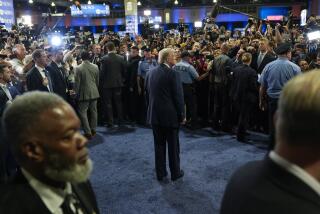Bush Rejects New Plan for Debating Clinton
- Share via
WASHINGTON — The Bush campaign on Tuesday brushed aside a bipartisan commission’s new proposal for breaking the deadlock over presidential debates, raising doubts about whether any debates will be held between President Bush and Democrat Bill Clinton during the 1992 campaign.
Clinton accepted the new proposal. It called for a first debate Sept. 29 in Louisville, Ky., and for negotiations between the two campaigns and the commission to resolve the issues that had led Bush to reject the commission’s original proposal--most important, the question of format.
Bush has opposed the commission’s recommendation of a single-moderator format, saying that in any debate, a panel of journalists should question the candidates. The Bush campaign has also insisted on bypassing the commission to arrange debates directly with the Clinton camp.
The commission said that, if Bush did not agree to the Louisville debate by noon today, it would have to cancel the event for lack of time to make necessary arrangements. There was no indication the President might change his mind before the deadline.
Tony Mitchell, a Bush campaign spokesman, insisted that the President is “eager to debate.” But, Mitchell said, he is willing to negotiate only with Arkansas Gov. Clinton’s campaign, not the bipartisan commission, which sponsored the 1988 debates between Bush and Massachusetts Gov. Michael S. Dukakis. After that election, the commission conducted an extensive study and heard from academics, journalists and political experts before recommending the single-moderator format.
The Democratic campaign, signaling it will continue trying to exploit Bush’s rejection of the commission’s proposals, declared that Clinton will show up next week in Louisville anyway, just as he did Tuesday in East Lansing, Mich.--site of what was to have been the first commission-sponsored debate.
The East Lansing debate was canceled after Bush declined to participate and his campaign refused to deal with the commission. Clinton, in his campaign appearance there, accused Bush of ducking the debate for fear of having to defend his economic record.
Tennessee Sen. Al Gore, the Democratic vice presidential nominee, said Tuesday: “If President Bush wants to stonewall Kentucky the same way he is stonewalling Michigan and stonewalling the American people, that will be his choice. . . . But bear in mind the bipartisan commission has chosen this format (of a single moderator) not to give one party or the other the advantage, but to give the American people the advantage of having a meaningful exchange of views without reporters unnecessarily butting in.”
With most polls showing Clinton enjoying double-digit leads over Bush, many analysts believe the President needs a debate more than his challenger in order to change the chemistry of the race. Not since polling started 56 years ago has a presidential candidate overcome a double-digit deficit at this stage of the campaign and gone on to win.
Douglas Bailey, a leading GOP analyst, called Bush’s rejection of the commission’s latest proposal “strange” under the circumstances. Bailey said: “Bush absolutely needs a debate, no doubt about that. And he needs it as quickly as he can get it.”
The Commission on Presidential Debates, whose members include five Republicans and five Democrats, tried to get the debates back on track Tuesday by proposing a meeting to resolve differences, including the format.
The new proposal was made in a letter to the chairmen of the Bush and Clinton campaigns by the co-chairmen of the commission--former Republican National Committee Chairman Frank J. Fahrenkopf Jr. and his former counterpart among Democrats, Paul G. Kirk Jr.
The commission originally proposed a vice presidential debate for Louisville on Sept. 29, a second presidential debate for San Diego on Oct. 4, and a third presidential debate for Richmond, Va., on Oct. 15.
The new proposal suggested--in addition to changing Louisville to a presidential debate--altering the scheduled presidential debate in San Diego to a vice presidential debate.
Mickey Kantor, Clinton’s campaign chairman, sent the commission a letter agreeing to all of its proposals, including meeting with the commission and the Bush campaign “to discuss any remaining issues concerning these debates.”
Robert M. Teeter, Bush’s campaign chairman, told the commission in a letter:
“We have your letter dated today. Enclosed is the copy of the letter we sent Mickey Kantor on Sept. 14 in which we proposed presidential and vice presidential debates on the same terms and conditions as have been used in past presidential elections and in which we offered to discuss this matter with the Clinton campaign.
“Also enclosed is a copy of my letter to Frank (Fahrenkopf) of Sept. 14 in which we make clear that our view is that the process used in the past four presidential elections has served the public interest and the interests of the candidates very well. We continue to be of that view.”
More to Read
Get the L.A. Times Politics newsletter
Deeply reported insights into legislation, politics and policy from Sacramento, Washington and beyond. In your inbox twice per week.
You may occasionally receive promotional content from the Los Angeles Times.










